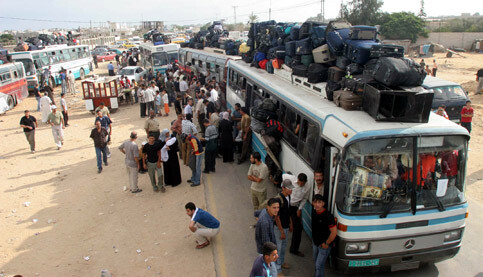United Nations News Service 26 September 2006

Palestinians wait to head towards Rafah crossing, the border between Gaza and Egypt. Hundreds of Palestinians jostle to get through the border on as it reopened briefly for the first time in weeks under an agreement with Israel, 22 September 2006. (MaanImages/Hatem Omar)
Describing a ‘tragic’ human rights situation for ordinary Palestinians living in the occupied territory, an independent United Nations expert today presented his report to the newly established Human Rights Council, sparking criticism from the Israeli representative that the work was one-sided and imbalanced.
John Dugard, Special Rapporteur on the situation of human rights in the Palestinian territories occupied since 1967, said that he wished to speak only about Israeli actions against ordinary, non-militant, non-activist Palestinians who simply wanted to lead a good life, educate their children and enjoy the basic amenities of life.
The human rights situation in the occupied Palestinian territory had deteriorated since 2001, and was intolerable, appalling, and tragic for ordinary Palestinians, he was reported as saying by a press release from the Office of the UN High Commissioner for Human Rights (OHCHR).
In response, Israeli Ambassador Itzhak Levanon said there could be no value in a report that follows a one-sided and imbalanced mandate that did not conform to the reality on the ground and which prejudged key issues. He said that, like its predecessors, it was characterized by errors of omission as well as distortions of both fact and law.
While it had been Israel’s intention to disengage from Gaza only to return to it, clearly Israel had the fundamental right and duty to defend and protect its citizens, Mr. Levanon said, adding that any Palestinian Government should renounce violence, recognize Israel and accept existing Israeli-Palestinian agreements.
Also speaking on behalf of a “concerned country,” Palestinian representative Mohammad Abu-Koash thanked the Rapporteur for his report and warned that the Middle East was in turmoil while no genuine effort had been expended to address its root cause, namely, ending the Israeli occupation of Palestinian, Syrian, and Lebanese territories.
Representatives from over 20 other countries also spoke during the debate before the 47-member Council moved on to discuss reports on the human rights situations in Cuba, Cambodia, Haiti and Somalia.
In wrapping up her presentation, Christine Chanet, Personal Representative of the High Commissioner for Human Rights on the situation of human rights in Cuba, highlighted the negative effects of the United States embargo, saying it was not a path to democracy and should not continue, but, as per her mandate, she said she could only deplore it and not recommend that it be lifted.
She said there was nothing new in terms of prison or detention conditions in Cuba but that these continued to be a source of concern. There were also no unknown detainees, all were recorded, and there was nothing hidden. Nor had there been any changes with regards to the legal arsenal and while there was some progress in gender equality, more work remained to be done.
In response, Juan Antonia Fernandez Palacios of Cuba said his country could not understand what concerns the European Union (EU) was talking about, as it kept secret prisons and was collaborating with the Central Intelligence Agency (CIA), as well as repressing people.
He also slammed Washington for committing atrocities, including in Guantanamo, and said it should therefore stop making critical comments that were insulting to the Council’s Member States. Over 10 countries also made statements on this report.
Regarding Cambodia, Yash Ghai, Special Representative of the Secretary-General on the situation of human rights in the country, said he was concerned that few of his or his predecessor’s recommendations had been implemented, and that human rights continued to be violated on a systemic scale.
Responding to Mr. Ghai’s report, Vun Chheang from Cambodia acknowledged the assistance and cooperation provided by the UN but said that the tragic events that took place from 1970 onwards had seriously affected the country, including the loss of skilled individuals and the annihilation of infrastructure.
Representatives from eight other countries were also involved in this debate.
Presenting his report on Haiti, Louis Joinet, Independent Expert appointed by the Secretary-General on the situation of human rights, highlighted the spirit of conciliation and reconciliation of the Haitian people, saying this had led to progress although acknowledging that much remained to be done, particularly regarding the protection of civilians.
In response, Jean-Claude Pierre of Haiti paid tribute to the Independent Expert and said that the Government had endeavoured to implement his recommendations. He also highlighted that the authorities had reinstated equality between men and women, and in order to curb violence had launched a programme to disarm armed groups.
Concluding its discussion of country-specific reports today, the Council also heard from Ghanim Alnajjar, Independent Expert on the situation of human rights in Somalia, who warned that although there was an apparent calm in the areas controlled by the Islamic Council Union, the situation would surely and disastrously deteriorate if the international community did not engage with Somali leaders.
In the dialogue that followed the presentation of the report, Finland spoke on behalf of the EU, and there were also statements from Italy, Djibouti, the US and Sudan. Rapporteurs are unpaid independent human rights experts.